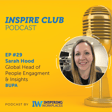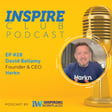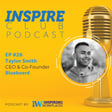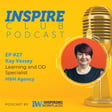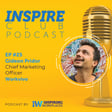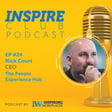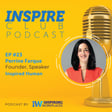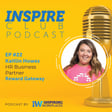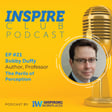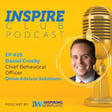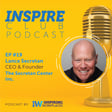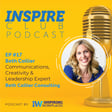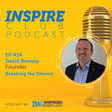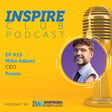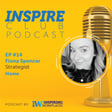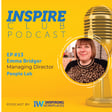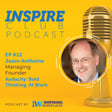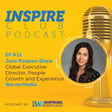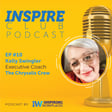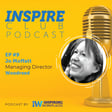Introduction and Recent Hosting
00:00:00
Speaker
Hello and welcome to another episode of Inspire Club from Inspiring Workplaces.
00:00:09
Speaker
I'm your host today, Matt Manners. Ruth Dance has been in for the past few weeks, doing a much better job than me, so thank you, Ruth. Looking forward to listening to your episodes as soon as I stop doing mine. But no, it's nice to be back, everyone.
Launch of Inspire Cities and Its Purpose
00:00:25
Speaker
Since I last was on the podcast, we've launched Inspire Cities.
00:00:31
Speaker
which are our local communities around the world, bringing face-to-face interaction, trying to change the world together through the world of work. We've had 20 cities at launch from Sydney, New York, London, Stockholm, you name it. So I'm hoping to get our guests potentially to have a city too. But it's really, really exciting to
00:00:53
Speaker
really try and drive change at a local level and be part of a bigger wider movement.
Managing Tiredness with Busy Schedules
00:00:57
Speaker
So that's been keeping me busy and last week was Mental Health Awareness Week in the UK and I suppose you know I've been talking about it takes courage for change and I'll be honest now and say for anyone who needs to hear this who's after a year-long lockdown and pandemic and has just been working really hard and has said
00:01:20
Speaker
things putting them in different directions and hasn't found the boundaries. I'm feeling it now. I'm feeling it having done the Inspire-a-Thon 24-hour event in January and having launched 20 Inspire cities and we've got probably another 20 who've come along and asked to launch soon too. We've got so much amazing stuff that we want to do and help really drive change at such an important part of
00:01:43
Speaker
of mankind, really. And I'm knackered. So this will be my last podcast for a while. And I'm going to turn the phone off for a few days, just all my devices, all my alerts, get into my garden of a house I'm renovating and just literally churn up soil and rake and just totally lose myself in manual labour for a few days.
00:02:06
Speaker
So I just think we need to probably say these things and that's the way change happens because it's totally fine to be tired. But my energy sources always come from other people. I think people are the greatest source of inspiration and our guest is no different.
Guest Mike Klein on Reykjavik and Cultural Dynamics
00:02:26
Speaker
A lot of our guests on Inspire Club
00:02:31
Speaker
I've been fans of them from afar for so long, but as anybody knows on social media, you feel like you know somebody and you've never met them. So today I get to meet Mike Klein, Mr. Internal Communications, Principal of Changing the Terms, anywhere I look.
00:02:48
Speaker
Mike is there. He's also a great guy, as you're about to find out on this podcast. And he's coming all the way from Reykjavik. So Inspire Iceland is a lovely ring to it. I know it's a tourism term, I believe, Mike. But hello and welcome to the Inspire Club. Thank you very much, Matt. I really appreciate the invitation. Well, great, great to have you. And how is Iceland right now?
00:03:13
Speaker
It's really bright and it's really chilly. I was up about four in the morning to let the cats in. The cats don't like to be out when it's light, and it's light at four in the morning here. We're heading towards midnight sun in about a month.
00:03:33
Speaker
And it's a different place. Reykjavik is an extremely pleasant city. In British terms, it's not that different from, say, a Brighton. It's about the same size, similar vibe, lots of culture, lots of good places to eat, lots of water.
00:03:55
Speaker
It's also a place where people speak two languages extremely well. They speak Icelandic to each other and they speak English to the rest of us. And it's interesting to see the dynamic when that happens. I wrote an article on that a couple of years ago. If anybody wants a copy of it, I'll be happy to send the link.
00:04:17
Speaker
It's also an interesting place to look at what's going on in the world right now because we don't have a lot of big businesses here alone. I have a lot of big companies and we're also two hours time-wise from continental Europe, one hour from British time and four hours from the USC's coast. So it's actually kind of a perfect
00:04:42
Speaker
venue for remote working. I'm basically a digital nomad. And the story line is I'm this digital nomad. I'm on this world famous island with volcanoes and beaches. The only issue is that it may be the only island of that type for digital nomad where the beach is colder than the Drix.
00:05:08
Speaker
Yeah, you're doing it different. It's a good point. Every time I'm flying over to the east coast, you know, always hopping, you go over over Iceland. It's always been on my list of places to go and I hope hopefully get there and have a chat with you soon. So maybe a beer, a cold beer by the sounds of it. Very cold beer. The beer here is excellent.
00:05:34
Speaker
So let's get to the first question, the only rule of Inspire Club, and that's sharing a story of somebody you've worked with who's inspired you along the way.
Flood Protection Project and Expert Insights
00:05:46
Speaker
I'm working on a very interesting project at the moment. It's a public-private partnership to bring permanent flood production to the largest city in the state of North Dakota, a city called Fargo, which has been popularized on stage and screen.
00:06:12
Speaker
We were working to get funding from the state legislature in North Dakota, and I found this public affairs firm in the state capital of Bismarck, which is run by this fellow by the name of Levi Andrist.
00:06:28
Speaker
And he's just been absolutely amazing to work with because he has this kind of encyclopedic knowledge of what's happening between all the different players and all the different forces at play in North Dakota. And one of the things that's really interesting about North Dakota
00:06:49
Speaker
is that it's got a reputation as a one-party state. It's very Republican, but it's not monolithic. You've got different kinds of Republicans. And also, as Levi is wanting to say, there's two political parties in North Dakota. There's one house of the legislature, and then there's the other house of the legislature.
00:07:11
Speaker
And my goal at that point was to try to get in a certain piece of communication out about how this project was doing with the voters and things like that. There was a survey, there was a poll. And Levi was just so level-headed and so gracious at the same time when he said, you know, the legislature right now is the only audience that matters to you.
00:07:35
Speaker
leave it with me. And I just felt at the same time while I was being told off if you will, I was also being completely supported by Levi. And that was a really unique and wonderful experience.
00:07:49
Speaker
Um, you know, there was a real sense of, you know, of team and we're all in this together. And I'm the guy with the ball right now. And I see, um, the goal line ahead. I know you're not supposed to use sports analogies, but I'm using one anyways. And it was like, of course you're right. How did you do it?
00:08:14
Speaker
And things went extremely well in the state legislature, and it was the level of support and the quality of support that I got from Levi and Amy and everybody on the team. The company's called GA, the GA Group, and I would recommend them to anybody, basically. So what is your why at
Driving Change in Internal Communications
00:08:38
Speaker
work? What gets you up in the morning when you're back here, Vic?
00:08:41
Speaker
Well, I mean, what gets me up in the morning, again, to use another sports analogy, is that, you know, I see internal communications, not necessarily as the most important thing in the world or the greatest thing ever, but it's something that I'm reasonably good at. And it affords me the opportunity to make a difference. And I get up
00:09:05
Speaker
every day thinking maybe this is the day that I score the winning goal. Maybe this is the day that I pass the winning path. Maybe this is the day that what I say or the question I ask shifts something for somebody that gets somebody towards their objectives. That's what really gets me up every day.
00:09:27
Speaker
It's not that I necessarily think that we're more noble than anybody else. I don't consider myself an employee advocate as such. For instance, I believe that at the end of the day, the organizations that are paying me to support their outcomes
00:09:44
Speaker
deserve my support to the extent that it means having their objectives align with the objectives of employees, align with the objectives of communities, align with ESG goals, great. But I see my responsibility as being to support the people for whom I work in achieving their goals. Now, what I do on my own as a thought leader and as an activist and as an agitator,
00:10:13
Speaker
is more to try to create a better environment in which myself and other internal communications people can operate. So whether it's writing an article, whether it's challenging things, like for right now, I see a total train wreck
Balancing Hybrid Work Challenges
00:10:29
Speaker
happening on this issue of hybrid working. And I see internal comms folks going all in and pushing for hybrid and ultra flexible solutions, which only favor employees.
00:10:44
Speaker
which, you know, I totally understand that people are feeling, you know, a bit beleaguered, a bit tenuous, you know, they've been working out of their houses, they've been working in, you know, very tense and
00:10:56
Speaker
stressed out environments, but employees only win if organizations win. This doesn't mean that all organizations that win take care of their employees, and that's another issue. But it's very rare that an organization that's not winning does a really good job of taking care of their employees. And so we've got to find solutions
00:11:19
Speaker
that A, help organizations win relative to their competitors and relative to the larger market, and we need to help organizations. Rather, we need to help set employee expectations.
00:11:32
Speaker
so that the idea that I'm going to decide 9 o'clock on Monday morning that I'm going to show up at 11 on Tuesday and my desk is going to be waiting for me and that there's going to be a meeting room for the team people who I want to have there to magically be there and have the meeting room waiting for them. This is not necessarily the right set of expectations to set.
00:11:59
Speaker
And so I'm keen not just to create a more favorable environment among people who we work for, but also a better set of expectations so that we can come across as more credible and more contributory to the solutions that we're trying to push.
00:12:18
Speaker
Absolutely. It has been a strange change and I think we were talking about having a debate on it actually. Because I think it has evolved from, I've always been a big advocate of empowering people, trusting them, letting them do the job.
00:12:36
Speaker
you've employed them to do. And that was thrust upon employers that didn't behave in that way when the pandemic happened and everybody had to work remotely and they had to give them the tools, they had to trust them to get on with the job and people have delivered. That was never, I don't think, an assumption at that moment in time, a year ago that
00:12:59
Speaker
we wouldn't return to work, return to the offices, because we've all been working very hard. So I don't think there was like, oh, well, we're never going to go back to the office. It was a case of let's try and improve the working habits and the way leadership treats its people.
00:13:15
Speaker
could allow them to perform better. So like most things in life, there's some sensible middle ground to be made here. Fully remote doesn't really make sense to me, but that's no choice. Fully back to how it was, probably nearer that way makes sense. I see very little middle ground. I see kind of a polarization.
00:13:40
Speaker
I don't see a middle ground of kind of halfway hybrid airport lounge type airport office setups where people come and go as they place. I think you're going to see a lot of what you're seeing. For example, Kellogg's, where they give employees a half day or one day a week to be wherever they want and do whatever they need to do in return for being physically present for four days a week. And I think that's going to be workable for a lot of people, not
00:14:10
Speaker
necessarily for everybody, but I think people will find ways to make that work. And the nice thing about that setup is that it creates predictability for the employee, it creates predictability for the business, and businesses love predictability. Then on the other end of the spectrum,
00:14:29
Speaker
there are maybe 10, 15, 20% of the management white collar workforce that really thrive in remote settings. And there will be enterprises that say, you know what, we can take some huge advantages.
00:14:46
Speaker
by going fully remote and by finding this type of person. I call us tribal people, people who identify with organizations, communities, ideas, who don't need to be in each other's camps and physical presence to be able to perform. And then you cut out a lot of the real estate costs. You cut some of the labor costs because you can hire from anywhere. You also probably get a bit of
00:15:17
Speaker
employee retention because when you create a role that's comfortable in your setting, it doesn't necessarily mean working from home. You will see a lot more employed people working in co-working settings.
00:15:32
Speaker
as a result of this, I'd say probably 60% work from office with a bit more flexibility than before the pandemic. 20% hardcore remote where people get together at conferences rather than the water cooler. And then you'll have some organizations for whom you can create a business model where it makes sense for people to come and go as they please. Yeah, I don't think we can forget that.
00:16:02
Speaker
landlords and all the industries built up around office workers, hospitality, restaurants, all those different industries that rely on people going to work. I think it's almost quite careless to just ignore that, because if all of a sudden we have half-empty buildings in our cities, then that could cause
00:16:26
Speaker
a lot of other problems in society, which would actually then trickle down and hit industry and jobs as well. So we need to be quite mindful of that. I think Manhattan's two most office-focused neighborhoods are 25% down in value. London, I know, there's been a lot of office space.
00:16:48
Speaker
free and empty. And then those coffee shop owners suddenly are seeing a lot less foot full. And that can all if all those landlords start defaulting and always kind of been happening, that has not got effects everywhere too. So we have to be careful on how we manage this from both sides of the spectrum.
Stress Management Techniques
00:17:06
Speaker
What do you do to beat stress?
00:17:09
Speaker
What do I do to beat stress? That's a really good question. To a certain extent, I don't. To a certain extent, it can be a variety of things, ranging from taking a walk to having some kind of silly things in my office. Like I have a little pig collection, and sometimes I just look at the pigs, and that kind of takes my mind off of things.
00:17:38
Speaker
just really depends on what the stress is. I mean, is it just the stress of having too much to do or is it the stress of dealing with contradictory demands from stakeholders or is it the stress of needing to get things to happen faster than anybody is willing to allow themselves to agree to? And these are all very different experiences.
00:18:06
Speaker
Some of them can be easily remedied with a deep breath or a less than serious thought. Others require conversations and negotiations and being straight with people.
00:18:20
Speaker
Yeah, very, very good advice. Deep breath helps me all the time. I was going to ask you, what would you do if all of those incidents struck at once, but I don't think we need to even go there. So talking of advice, what's the best piece of advice you've ever been given?
Political Strategies in Internal Communications
00:18:40
Speaker
The best piece of advice I've ever been given. One that resonates. You still think about it today. It's practical. It's helped you throughout your career.
00:18:50
Speaker
Well, I had a boss coach mentor back in the 90s, who insisted on teaching me, I was running political campaigns at the time. And he insisted on teaching me these very old comments about political campaigns that Abraham Lincoln came up with in 1840. And he called them the Lincoln rules. And the main thing about these rules is that
00:19:21
Speaker
When you look at them, they don't just have everything to do with political campaigns. They actually have everything to do with anything you're trying to accomplish in an organization or community. And the rules go like this. Make a perfect list of the voters, determine with certainty who they'll support, for those who are undecided, someone whom they trust or persuade them, and turn out all the good voters on election day, or more precisely, the good weeks, which was Lincoln's party at the time.
00:19:50
Speaker
And when you think about it from an internal comms or business comp standpoint, making a perfect list of the voters, who are the actual stakeholders who have an influence on the outcome of something? It's not necessarily everybody. It's not necessarily we need to engage everybody because it's the right thing to do. No, you need to engage the people who actually have a stake in the outcome.
00:20:11
Speaker
B, determining with certainty whom they'll support. In the corporate world, you assume, because you're giving someone a paycheck, that they'll do what you tell them to do. But we know that's not the case. There's whole books about resistance in organizations. These books wouldn't be written if this idea that you did what you told was actually true. So determining with certainty whom everybody will support is a real thing even in the business world.
00:20:42
Speaker
And then for someone who is undecided, send someone in whom they trust to persuade them. This is the single biggest failure area of corporate communication. I mean, if you see failures in corporate communication, I would say a majority of them have to do with failure to adopt this principle.
00:21:02
Speaker
You have companies sending the spokespeople that they trust instead of who the recipients trust, instead of who the audience trusts. If you've got a tenuous labor situation, do you communicate through your CFO or do you communicate through the union leadership? You'll get very different results from either of those approaches. And then finally, turning out the good voters, the good wigs on election day.
00:21:29
Speaker
Organizations spend so much time and energy mobilizing their opposition because they feel they have a right to, that they have to, that it's morally wrong or that, as we said, everybody will do what they're told to do in the end of the day. And effective internal communications is really about getting the people who are going to contribute to participate and not necessarily activating those who have other intentions.
00:21:58
Speaker
I'm amazing. I always think when I hear people reference President Lincoln, how on earth did this man have so much wisdom because there are so many lying statements
00:22:15
Speaker
that come from him. Excuse me. That's so relevant still today. And I haven't even heard the Lincoln rules. So that's just another amazing amount of wisdom that's come from him. I love the idea of
00:22:32
Speaker
communicating to people that the recipients trust, not who you trust. As somebody who's been in comms for a long time, that's something I hadn't really ever considered, actually. So thank you very much for sharing that wisdom with me today. I'm ready to keep that in mind with everything I do moving forward. So thank you very much.
Understanding Job Role Expectations
00:22:58
Speaker
If you could swap jobs with anybody for a day, who would you swap with? Swapping jobs with anybody for a day. There are so many places I could go with this one, most of which would get me in no serious trouble. Okay, let's try to avoid that. I mean, certain political leaders in the world are at the top of the list.
00:23:26
Speaker
But I will take political leaders off the list. And I would say,
00:23:38
Speaker
I need to think about this one. Okay. Okay. Well, let's come back to that. We'll go through some quick fire questions around Mike and personal life. So are you an early bird or a night owl? Early bird. Awesome. What's your favorite album? And what's a go-to song that you put on that helps fire you up and gets you motivated? Utopia is just one planet.
00:24:08
Speaker
No, you tell me it's Oops Wrong Planet and the song is Just One Victory. Awesome, okay. Okay, that's gonna go on our playlist. One additional song which I actually use is my theme song.
00:24:20
Speaker
is Sandstorm by Darude. Okay, well, that's, I think you might be the first person to get torn to the inspire list on Spotify. So Darude Sandstorm is an absolute belter of a song. Absolutely. But as I always say, when I'm lucky to be hosting the podcast, I'm going to have to go listen to that as soon as we finish. So what's one of the funniest things that's happened to you of late? Well, I was working
00:24:50
Speaker
I'm the beach here in Reykjavik with my wife. Reykjavik's a beautiful city. It's very well situated. And there's beaches and water everywhere. And because Iceland is a kind of a homogenous country of 350,000, they've taken in some immigrants. But by and large, the native population is the genetic population.
00:25:18
Speaker
the genetic makeup is fairly closed. People look really similar to each other. And so my wife was talking with this lady and they were talking about their kids. They knew each other. Their kids were friends. They're talking about their respective conversations. My stepson is half Pakistani and so we opted for a non-religious confirmation at this stage, wanted to give him a
00:25:46
Speaker
a bit of flexibility in terms of his own choices. The other lady was talking about the church confirmation that she was having for his kids. And my wife introduced me as, you know, my husband being a Jew from Chicago, you know, has his own views on the subject. And we walked about 30, 40 meters away and said, you knew who that was, don't you? And I said, no. He says, oh, that was the prime minister. Oh, wow.
00:26:16
Speaker
Wow. Wow. That's amazing. Yeah. That's fantastic.
00:26:29
Speaker
that even could take place and also not to even know about it as well, to be honest. How good's that? Awesome. So going out for dinner next week with the Prime Minister of Iceland or...? No, but chances are I will probably meet her in a social setting between now and the end of the year. She is following me on Twitter and that's a relatively rare
00:26:53
Speaker
phenomenon her followers versus followers are about a 10 to 1 split. So yeah, they that as well as they always are. That's fantastic. Well, that's not just that's not funny. That's just amazing story. So happy days. What's one of those household chores that you always try and leave to last so somebody else does it? That's a really good question around here because such a long list.
00:27:23
Speaker
I think they're all equal. Equally bad, equally good. Equally, equally indifferent. I mean, there's none that I particularly despise. Okay. All right. Well, lucky lucky family that you do them all as well as equally as each other. No, I don't do them as equally as each other. I just do them equally badly.
00:27:50
Speaker
Um, favorite film and this isn't necessarily the best film ever made, but that could be it could be your favorite film, but the one you can just put on and watch. Godfather. One. Awesome. Okay, awesome. And one. Okay. What's something you'll do but have never done again? What's something that I would do and never do again? Um,
00:28:19
Speaker
There are a couple things on that list. I would say drinking a bottle of mezcal would be pretty much at the top of that list. Yeah. I imagine that would be, uh, that was something that I did in college. And, you know, I remember it, but just basically, um, what else would I do? Well, I think another thing is, you know,
00:28:50
Speaker
taking a role really without some deep conversations with the various people involved. That was something I did a few years ago and it ended up being a far from entertaining experience. And I think having been independent for most of the last four or five years,
00:29:16
Speaker
I'm not saying I would never take an in-house role, but there's gotta be a meaning of the minds and there's gotta be a configuration of resources that'll allow for a successful situation.
00:29:32
Speaker
Yeah, I agree. And I'm actually first person to mention a role. And I'm amazed it hasn't come up before on this question. Because yeah, that's
00:29:47
Speaker
I imagine a specific role could be quite a big regret for a lot of people. One of my funniest roles I took, the only time I resigned within a month before I started my own business was I'd come back from Australia, back to England, and I was working to live in London for about two years, and I weren't more people with the ins and outs of it, but I took a job and hadn't really done too much investigation, but ended up being
00:30:20
Speaker
30 women and two men. And that's not that doesn't that's not a problem in itself. But the other other person was called Matt. And he was sat they sat me next to the other Matt and the map was the accountant for the team in a bunch of communicators. So basically, every time somebody said Matt, maybe one in 100 it was for me. This just
00:30:40
Speaker
in the team I was in or the the practice I was in there was
00:30:45
Speaker
This just isn't going to work, so I bailed quite soon after. You needed a nickname.
00:30:53
Speaker
Yeah, I needed a nickname, which I tried to get in there. But you can't, if having having had a nickname that stuck, it's you're given the nickname, you can't give yourself the nickname. So no, that's also true. I've tried that trick before. So everybody was amazing by when this just isn't gonna work. So yeah, I was I was gone. Best place in the world you visited and could be living there right now. And if you could be anywhere in the world right now, where would you be?
Favorite Travel Destinations and Culture
00:31:19
Speaker
Well, the best place I visited actually, um, I mean, I visited some great places, but there's really two standouts. One is, um, and these are places that people don't normally visit because otherwise it's not really worth mentioning. One is Barolocha in Argentina. So that's the big ski resort in Argentina. And it's just this fusion of history and culture and circumstances and natural beauty.
00:31:49
Speaker
and outstanding cuisine, and it's all pretty reasonable all in one place. It's about a two-hour flight from Buenos Aires. It's not, you know, you really need to want to go there, but it's literally the Alps, the place is called Baroloche. It's basically the Alps in South America. Yeah, okay, wow.
00:32:13
Speaker
And then the other place, which is a place that I want to get back to the most, but I've just never really figured out how to organize the timing because it's a bit hard to get to, and that's Sarajevo in Bosnia. Sarajevo, people still think there's a war going on there, but the war actually ended about 30 years ago.
00:32:39
Speaker
And the city looks like a love child between Prague and Istanbul. I mean, the architecture there is off the charts. You know, Central European, Islamic, communist, all in the same place. And there's really nothing else like it. And the food is great, and it's absolutely piss cheap.
00:33:02
Speaker
That's what a description. A love child between Prague and Istanbul, that really paints a picture and makes me want to go. Thank you so much. And last question, and thank you for albeit a unique interview, a conversation for the first time in Spy Club.
Potential Guest Recommendations
00:33:23
Speaker
Who do you think we should go try and secure as a guest for a feature episode?
00:33:28
Speaker
Three of the most, I'm going to come up with three, three of the most interesting people in the space right now who don't get a lot of airtime on the side of the, you know, kind of in the English action world. One is Alejandro Formantruk. He is the, you know, really the driving force behind internal communication in the Spanish speaking world.
00:33:53
Speaker
There's a fellow by the name of Christopher Wade, who is head of global internal content comes for a deco, which is the big employment agency company, also an extremely interesting guy. And trying to think who else? Who doesn't return my phone calls?
00:34:24
Speaker
That's a great way to keep at it. Probably Susan Kelly, who's the head of internal comms at Syngenta.
00:34:31
Speaker
Awesome. Thank you so much. Well, if we're able to get one of them, we'll be very, very lucky indeed. And thank you, Mike, for everything that you do, for being very cool, kind, open to talk and coming up with some very cool ideas that hopefully we can make a reality in the next 12 months as well. So yeah, Mike and I have been knocking some ideas back and forth. So hopefully that can help you all see what they look like in the next 12 months or so.
00:35:01
Speaker
Thanks to everybody that's listening. You may keep what it is and thanks again, Mike. Speak soon. You go.

